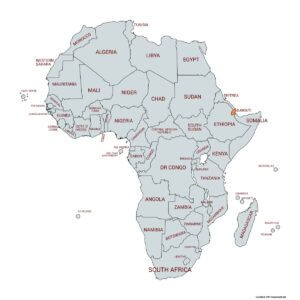- 关于邀请出席阿塞拜疆投 04-17
- 关于参加乌兹别克斯坦花 04-08
- 关于组织企业赴尼泊尔出 03-07
- 关于组织参加2024中国国 02-29
- 关于邀请出席2024中国企 02-22
- 蒋赟到访赞比亚驻华大使馆 04-26
- 蒋赟与到访的济南市代表团 04-26
- 蒋赟同所罗门群岛驻华大使 04-26
- 王克文出席中柬数字经济产 04-26
- 王克文与中土柬埔寨公司座 04-26

Demographic Information: Djibouti Republic has an estimated population of 921,804 comprising mostly of younger population (less than 25 years) which makes up about 50.2% of the population, those in the age bracket of 25-64 years makes up about 45.7% of the population and above 65 years age group makes up about 4.0% of the population. Average population density is estimated at 43 inhabitants/km2. In terms of human development indicators, it has a life expectancy of 67.4 years (Women) and 62.1 years (Men). It achieved universal primary education with an 75.29% Primary enrolment rate in 2019.
Broad Economic Overview: The Djibouti economy is a service-based economy as it depends on commerce due to its strategic location at the mouth of the Red Sea, making its deep-water port facilities and railway key assets. It provides services as both a transit port for the region and an international transhipment and refuelling centre. Djibouti has few natural resources and little industry. In 2018, the country launched Africa’s biggest free-trade zone to be managed by Chinese companies. Real GDP growth has remained strong, estimated at 7.5% for 2019 driven by public investment in rail and port infrastructure. It recorded a modest GDP growth in the past 5 years having grown 6.5% (5yr compound annual growth) over the period. Its currency is Djibouti Franc which is pegged to US Dollars. Main export includes reexports, hides and skins, scrap metal etc. Major imports include Petroleum Product, Clothing, Chemicals, Foods, transport equipment’s etc.
Investment Opportunities: Djibouti government has implemented three major policies which is expected to boost economic momentum (National Employment Policy 2014–24 which aims to develop the small and medium enterprises subsector, the Education Action Plan 2017–19, and the National Agricultural and Food Security Investment Plan 2016–20). Also, the government is pursuing infrastructure projects which aims to transform the country into a logistics and commercial hub for East Africa. Sectors with potential investment opportunities include Livestock, Tourism, Fishing, Banking, Infrastructure, Telecom, Renewable Energy and Housing.
相关热词搜索:
上一篇:刚果民主共和国投资环境介绍
下一篇:厄立特里亚投资环境介绍